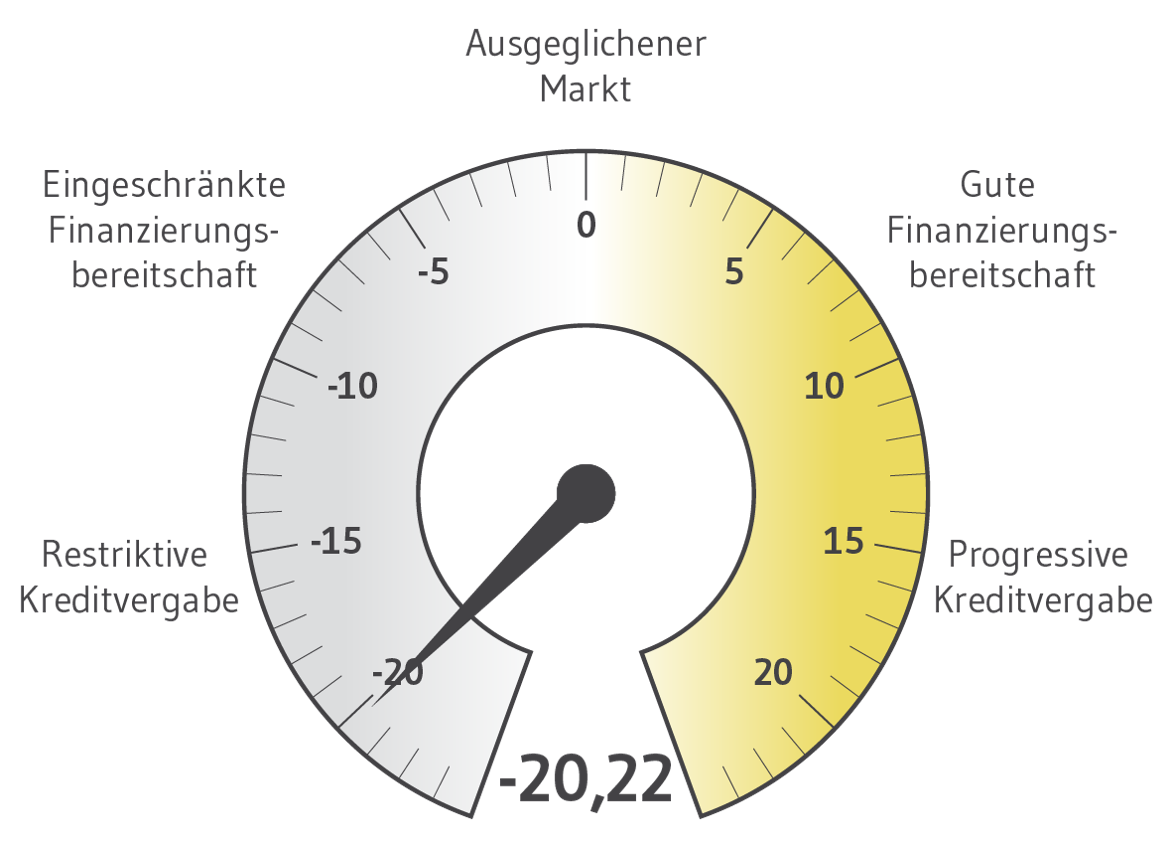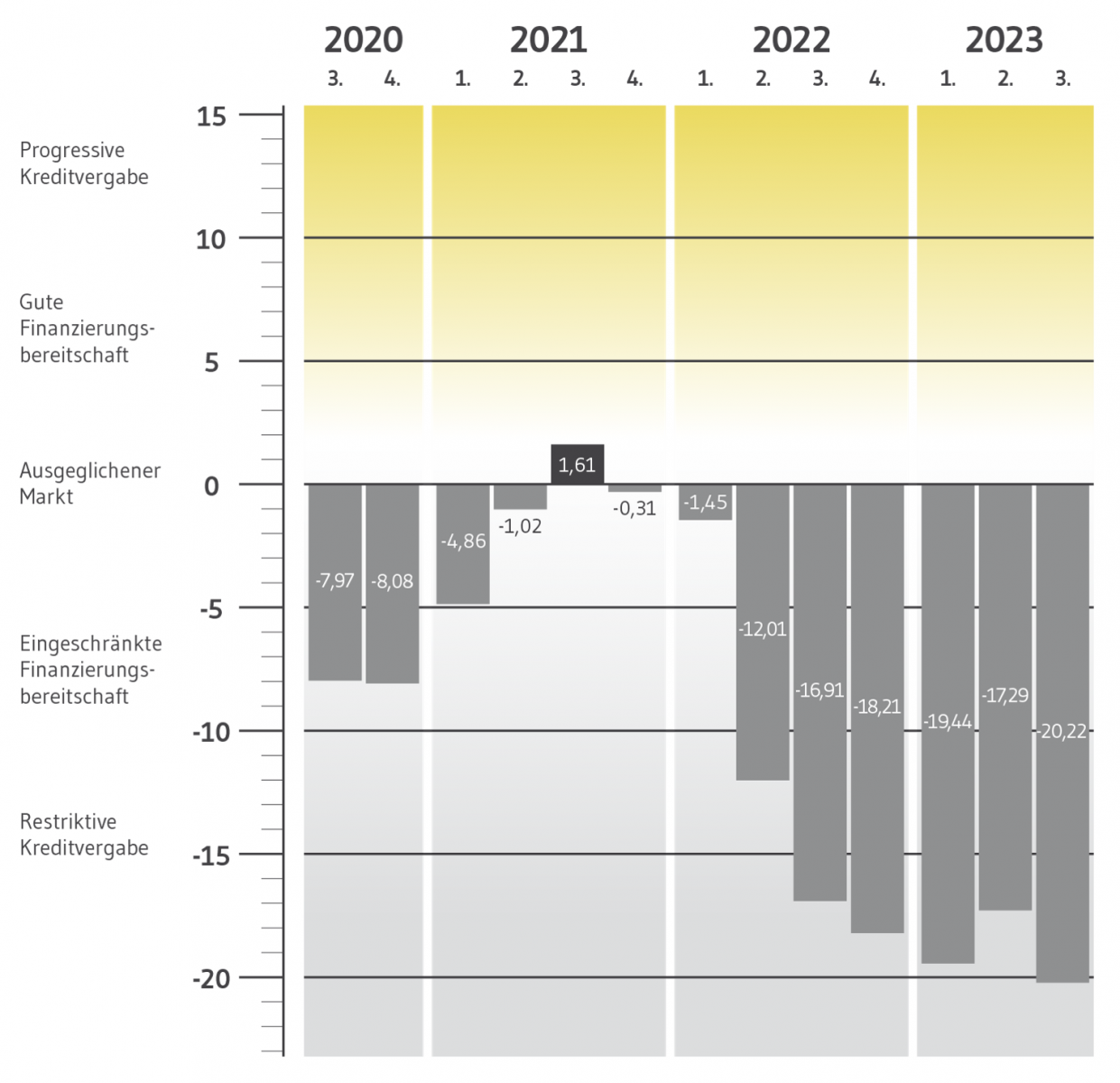BF.Quartalsbarometer Q2 2023: Sentiment Index for Real Estate Lenders Drops to New Record Low
The BF.Quartalsbarometer score has hit another low. After sentiment had slightly brightened and climbed to a barometer level of -17.29 during the previous quarter, the latest score of the sentiment index for real estate lenders is back down to -20.22 points. Among the reasons to explain the all-time low are a variety of factors, most notably the assessment of the situation on the financing market: 80.4 percent of the survey respondents spoke of more restrictive terms of financing, which equals a quarter-over-quarter increase by 7.7 percentage points. The number of respondents who noted a downward trend in new lendings also increased since the last survey. Liquidity costs were reported to have either remained unchanged or recently gone up by 53.5 percent of the respondents, which is an increase by 2.3 percentage points over the previous quarter. This represents yet another factor putting pressure on the Barometer score.
Francesco Fedele, the CEO of BF.direkt AG, commented: “The Barometer score matches the impression that the market has made on us lately. Add to this: Many survey respondents probably filled in the questionnaire with the insolvencies of property developer in recent weeks and months weighing on their minds.”
During the presentation of the BF.Quarterly Barometer at an online press conference, Andreas Trumpp, Head of Market Intelligence & Foresight at Colliers, added: “The low-interest-driven super-cycle is over. Increasingly, real estate is forced to compete with government and corporate bonds whose rates of return have noticeably bounced back from where they were two or three years ago. Generally speaking, there is significantly less dry powder available to the market. At the same time, the changed funding environment will cause major debt capital gaps that will have to be plugged with equity capital. It is an effect that will further reduce the capital that is available on the market for acquisitions.”
Meanwhile, margins discontinued their upward surge, according to the latest BF.Quartalsbarometer survey. The average margin in portfolio financing dropped from 245.1 basis points during the previous quarter down to 220.5 basis points; the going rate in project development financing is now 306.6 basis points, down from 342.3 basis points in Q2. Loan-to-value ratios are also in decline. The average loan-to-value ratios in portfolio development declined from 65.28 to 64.19 percent, whereas loan-to-cost ratios in the property development segment dropped from 69.33 to 68.62 percent.
The focal points in new lendings experienced no major changes compared to the previous quarter. The factor that has emerged as the most important one, which is risk minimisation, used to be deemed negligible in new lendings as recently as early as 2020. However, the maximisation of revenues and returns remained almost equally important during the same period of time.
Competition among borrowers has lost its intensity, as a look at loans not granted reveals. The answer “Demand too strong, property was picked up by a competitor” hardly played a role anymore, unlike in Q1 2020. Instead, the answer “Borrower committed insufficient equity” seriously gained in significance. Manuel Köppel, CFO of BF.direkt AG, commented: “Here, we find our experience confirmed that the real estate industry in general faces an equity crunch, much more so than a credit crunch. Borrowers who bring sufficient equity capital to the table have an easier time obtaining loans. Potential equity providers are waiting in the wings no doubt, but most are currently holding back until the financial restructuring processes are completed.”
“Even though the Quartalsbarometer clearly presents a bleak picture, there is a silver lining of positive aspects. For example, a closer look at lending volumes tells us that medium- and large-volume loans were definitely granted, too. And in answer to the question which property types banks are prepared to finance it is safe to say that the willingness to finance hotels has increased,” observed Andreas Schulten, Generally Authorised Agent of bulwiengesa.
About the Methodology
The BF.Quartalsbarometer is compiled on behalf of BF.direkt AG, a specialist for real estate finance, by analytics firm bulwiengesa AG. The index provides a comprehensive picture of the sentiment and business climate among real estate lenders in Germany.
For the survey underlying the BF.Quartalsbarometer, a total of about 110 experts are polled four times a year, all of whom are directly responsible for approving loans to real estate companies. The panel is staffed with representatives of diverse banks and other types of financiers. The BF.Quartalsbarometer score is compiled from diverse questionnaire components: the assessment of changes in the terms of financing, the trend in new lendings, the amount of loan tranches granted, the risk tolerance of lenders by asset class, the level of LTV/LTC ratios, the development of margins, the importance of alternative funding options, and the trend in liquidity costs.
The Quartalsbarometer for Q3 2023 is available for download in German language under the following link:
https://www.bf-direkt.de/










